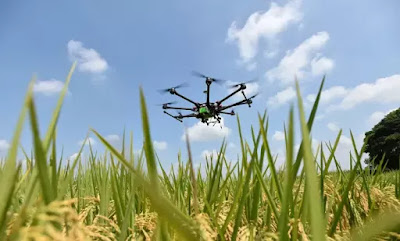Newcastle Disease in Poultry
 |
| Twisting of the Head and Neck |
Sometimes,
we you just see your Poultry birds gasping and coughing, dragging their legs,
dropping their wings, passing greenish watery faeces and most importantly twisting
of the head and neck. You start to wonder what’s wrong with the birds. Let Agric Naija take you on a ride of what might be the cause, how to prevent it and
what can be done in case of occurrence.
Newcastle
disease
is an infection of domestic poultry and other bird species with virulent
Newcastle disease virus (NDV). It is a worldwide problem that presents
primarily as an acute respiratory disease, but depression, nervous
manifestations, or diarrhea may be the predominant clinical form. Severity depends
on the virulence of the infecting virus and host susceptibility. Occurrence of
the disease is reportable and may result in trade restrictions.
Newcastle
Disease is caused by a virus. The first symptoms usually consists of
respiratory distress and rasping followed in 1 or 2 days by a paralysis of legs
and wings and bad down between legs or straight back over shoulders. A twisting
of the neck (stargazing may also be observed). In adult birds, loss of
production along with some respiratory distress and paralysis after 4 to 6
days.
Transmission:
Newcastle
disease can be transmitted in various ways which includes;
Direct
contact with secretions, especially faeces, from infected birds, Contaminated
feed, water, implements, premises, human clothing, etc.
The
mortality and morbidity rates vary among species, and with the strain of virus
Incubation
period is 4-6 days
Symptoms
/ Diagnosis
Respiratory
and/or nervous signs: gasping and coughing
drooping
wings, dragging legs, twisting of the head and neck, circling, depression,
inappetence, complete paralysis
Partial
or complete cessation of egg production
Eggs
are misshapen, rough-shelled, thin-shelled and contain watery albumen
Greenish
watery diarrhea
Swelling
of the tissues around the eyes and in the neck
Morbidity
and mortality depend on virulence of the virus strain, degree of vaccinal
immunity, environmental conditions, and condition of the flock
PREVENTION AND
CONTROL
There
is currently no treatment.
Prevention:
Vaccination.
Procedures
to control the disease:
- Strict isolation of outbreaks
- Destruction of all infected and exposed birds
- Thorough cleaning and disinfection of premises
- Proper carcass disposal
- Pest control in flocks
- Depopulation followed by 21 days before restocking
- Avoidance of contact with birds of unknown health status
- Control of human traffic.
- One age group per farm ('all in-all out') breeding is recommended
- Vaccination with live and/or oil emulsion vaccines
VIDEO: Newcastle Disease
You can also Subscribe to our YouTube channel Here
The
next time you have a new set of birds or your birds exhibits such signs, you
know what to do.
Why
not drop your comments to add information about the disease that might have
been omitted or your experience with Newcastle disease............



Comments
Post a Comment